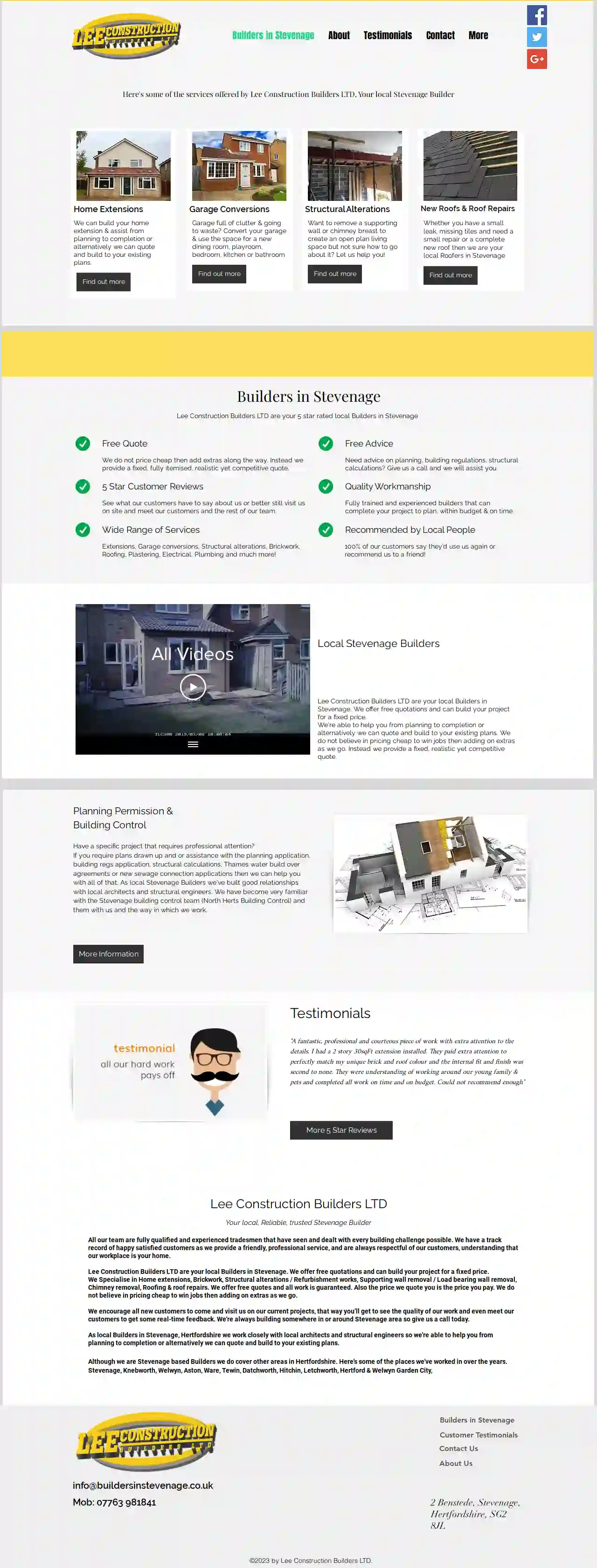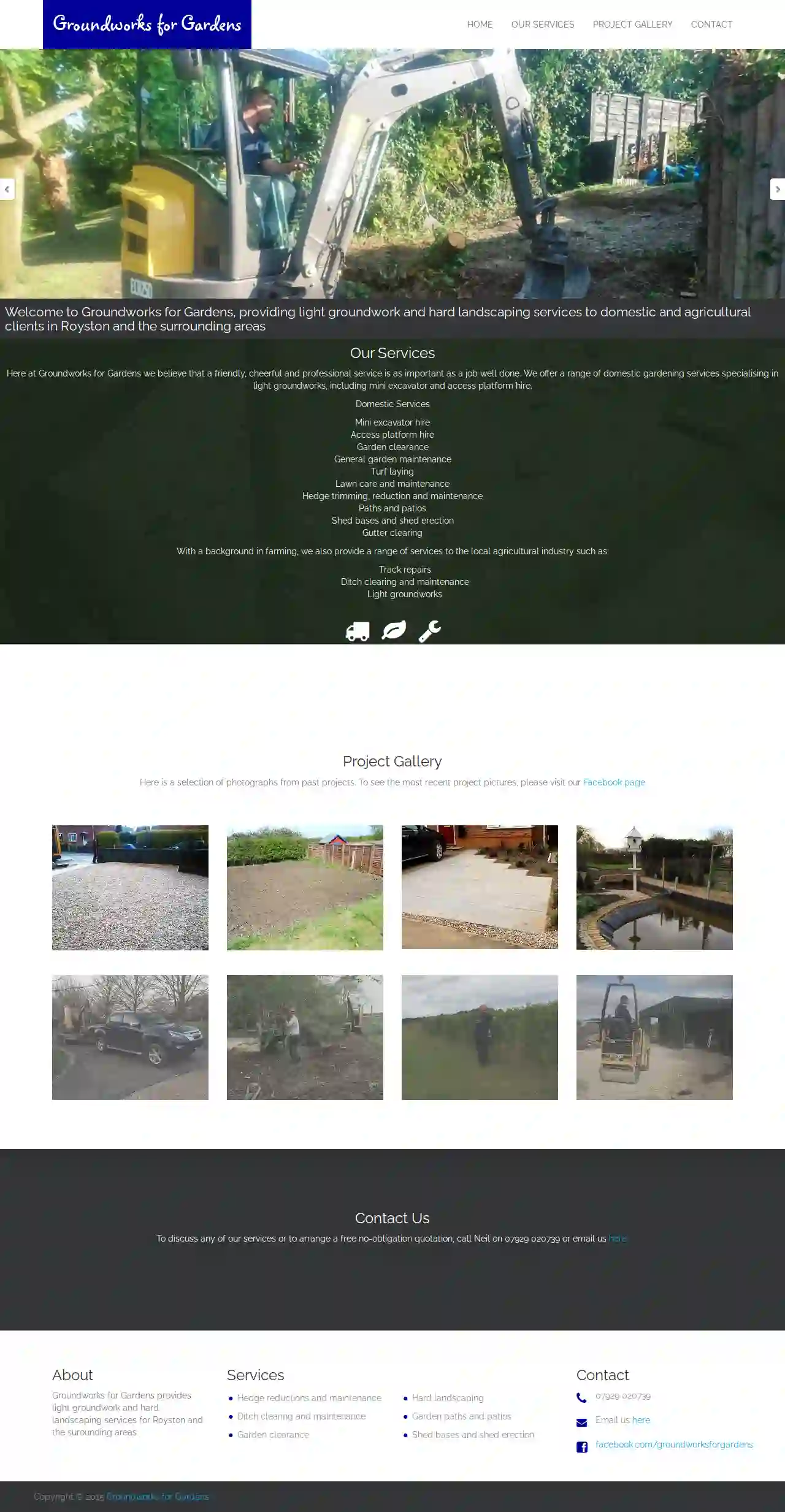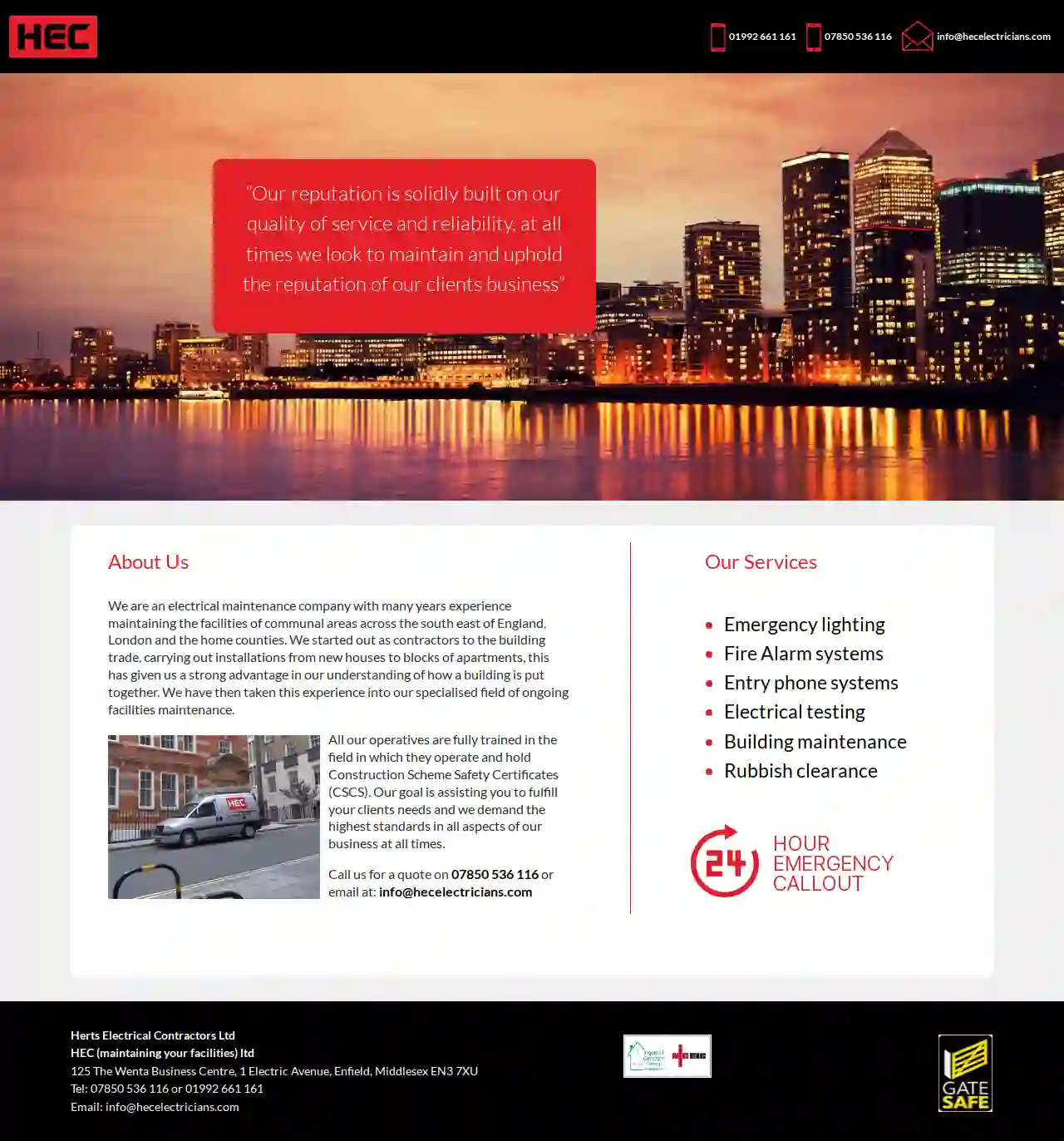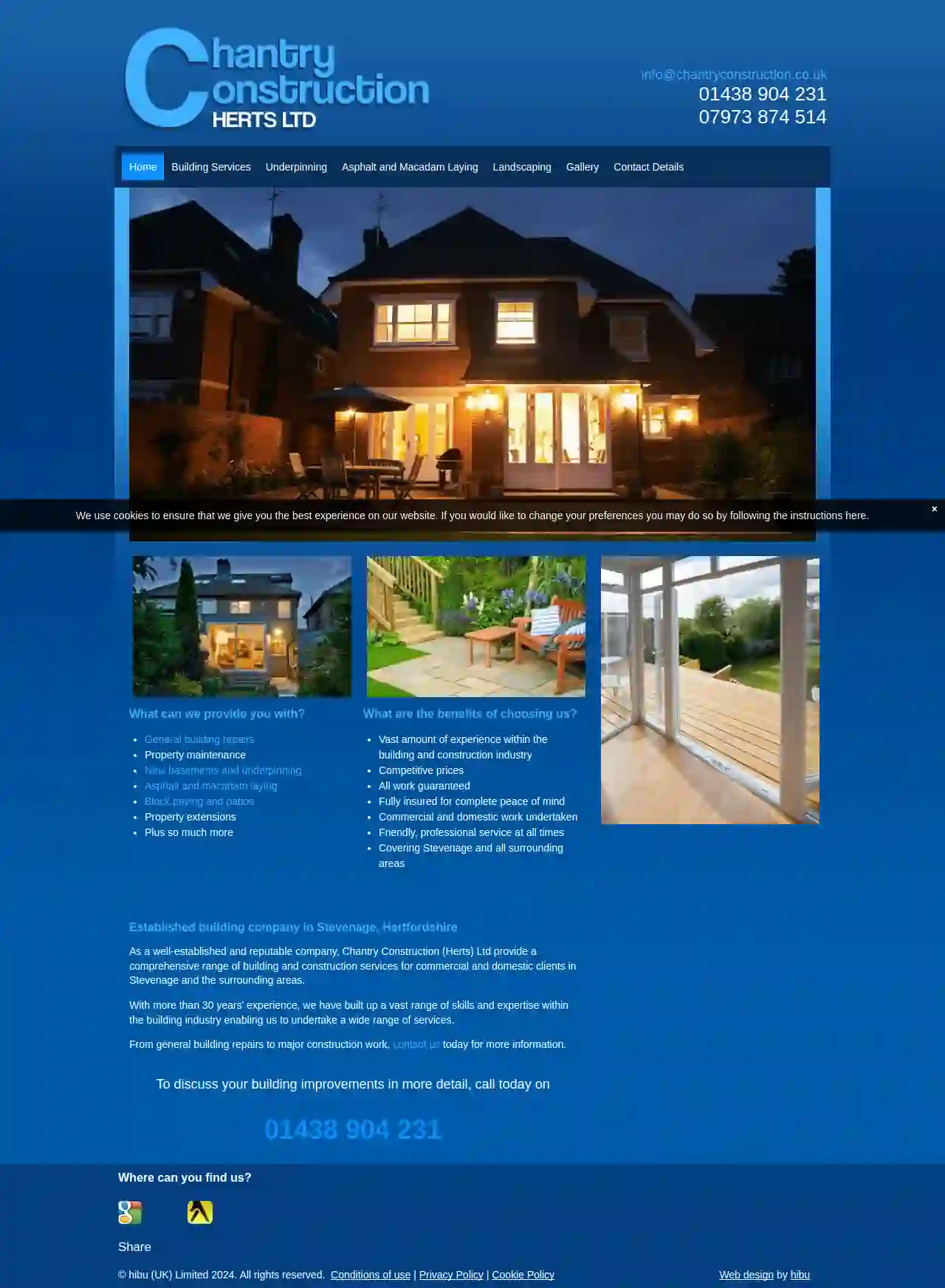Demolition Contractors Radlett
Top 10 Demolition Contractor in Radlett
Receive up to 3 Demolition Services quotes for your project today! Compare profiles, reviews, accreditations, portfolio, etc... and choose the best deal.

Lee Construction Builders LTD
571 reviews2 Benstede, Stevenage, SG2 8JL, GBLee Construction Builders LTD Your local, Reliable, trusted Stevenage Builder All our team are fully qualified and experienced tradesmen that have seen and dealt with every building challenge possible. We have a track record of happy satisfied customers as we provide a friendly, professional service, and are always respectful of our customers, understanding that our workplace is your home. Lee Construction Builders LTD are your local Builders in Stevenage. We offer free quotations and can build your project for a fixed price. We Specialise in Home extensions, Brickwork, Structural alterations / Refurbishment works, Supporting wall removal / Load bearing wall removal, Chimney removal, Roofing & roof repairs. We offer free quotes and all work is guaranteed. Also the price we quote you is the price you pay. We do not believe in pricing cheap to win jobs then adding on extras as we go. We encourage all new customers to come and visit us on our current projects, that way you’ll get to see the quality of our work and even meet our customers to get some real-time feedback. We're always building somewhere in or around Stevenage area so give us a call today. As local Builders in Stevenage, Hertfordshire we work closely with local architects and structural engineers so we're able to help you from planning to completion or alternatively we can quote and build to your existing plans. Although we are Stevenage based Builders we do cover other areas in Hertfordshire. Here's some of the places we've worked in over the years. Stevenage, Knebworth, Welwyn, Aston, Ware, Tewin, Datchworth, Hitchin, Letchworth, Hertford & Welwyn Garden City
- Services
- Why Us?
- Testimonials
- Gallery
Get Quote
Groundworks for gardens
56 reviewsHertford, GBWelcome to Groundworks for Gardens Groundworks for Gardens provides light groundwork and hard landscaping services for Royston and the surrounding areas. We believe that a friendly, cheerful and professional service is as important as a job well done. We offer a range of domestic gardening services specialising in light groundworks, including mini excavator and access platform hire. With a background in farming, we also provide a range of services to the local agricultural industry such as track repairs, ditch clearing and maintenance, and light groundworks.
- Services
- Why Us?
- Gallery
Get Quote
OJP Contracts ltd
51 reviewsThe Cattlesheds, Brickendon, Hertfordshire, SG13 8NT, GBOur History OJP Contracts was established in 2017, drawing upon a deep-rooted family history in farming, agriculture, haulage, and groundworks. The need to modernize and expand the family farm in response to a changing industry led OJP to diversify its operations. OJP Contracts is a passionate company dedicated to delivering projects to the highest standards. We believe in getting the job done right the first time, with exceptional communication and customer interaction, consistently exceeding expectations. Our work is primarily driven by reputation, and we believe word-of-mouth advertising is the most effective form. We carefully select our team members to ensure they embody our core values of "right first time" and "solutions-oriented." We continuously invest in new equipment, vehicles, and tools, along with extensive training for our staff, encompassing the following: Our Staff SMSTS SSSTS CSCS up to gold card Qualified operators of all in-house plant (excavators, dumpers, forklift, telehandler, tractor, crane operator and slinger) Working at height Harness awareness Face fit tested PASMA ALLMI IPAF Abrasive wheels Thames water Passports UKPN substation entry Asbestos Awareness trained Blue water hygiene SHEA gas Our Team Oliver Peters - Director Oliver founded the company in 2017 with the vision of building a business that could handle all aspects of groundworks and civils. Since then, we have continued the agricultural side of the company and expanded into installations and winter maintenance. Prior to starting OJP, Oliver studied at Harper Adams University, where he earned a degree in Engineering. The business has been built on the experience and knowledge he has gained in various sectors of industry, providing a well-rounded perspective to tackle new challenges and opportunities that the business faces. Feel free to contact Oliver at [email protected] Tom Osborne – Operations Director Tom joined OJP Contracts in 2021, bringing with him 13 years of experience working in the construction and civil engineering industries on a wide range of projects for several tier 1 contractors. Tom began his career as an assistant site manager, progressing to site manager and project manager on numerous high-profile projects before taking on a contracts manager role, overseeing multiple schemes. Tom has joined OJP as the operational lead and oversees the management of projects from the enquiry and tender stage, through delivery and aftercare, ensuring each project meets the high standards.
- Services
- Why Us?
- Our Team
- Testimonials
- Gallery
Get Quote
Herts Electrical Contractors Ltd
125 The Wenta Business Centre, 1 Electric Avenue, Enfield, EN3 7XU, GBHEC Electricians: Your Trusted Partner for Electrical Maintenance HEC Electricians is a reputable electrical maintenance company with extensive experience in maintaining facilities across the South East of England, London, and the Home Counties. We have a strong foundation in the building trade, having worked on projects ranging from new houses to apartment blocks. This experience has given us a deep understanding of building construction, which we leverage in our specialized field of ongoing facilities maintenance. We are committed to providing high-quality services and ensuring the reliability of our work. Our goal is to assist you in meeting your clients' needs, and we maintain the highest standards in all aspects of our business. Our team of fully trained operatives holds Construction Scheme Safety Certificates (CSCS), ensuring that all work is carried out safely and efficiently. We are dedicated to upholding the reputation of our clients' businesses. Contact us today for a free quote on 07850 536 116 or email us at [email protected].
- Services
- Why Us?
- Gallery
Get Quote
MD Construct Builders Ltd
55 reviews52 The Hedgerows, Stevenage, SG2 7BW, GBMD Construct Builders MD Construct Builders is a London based construction company specialising in Loft Conversions, Extensions, Refurbishments, Electrics, Plumbing etc with an extensive portfolio of projects in premier locations across London. 20 Years + Experience We have over 20 years of experience undertaking any work related to Refurbishment, Property maintenance and repair, General Building services etc. We provide a complete package of services, from consultation and diagnosis through to design and implementation of the repair strategy. Our Commitment Our satisfaction comes through delivering the best work possible. We pride ourselves on excelling to your project’s needs.
- Services
- Why Us?
- Gallery
Get Quote
Grafton Building Consultancy Ltd
43 reviews15 Mead Business Centre, Mead Lane, Hertford, 15 Mead Business Centre Mead Lane, SG13 7BJ, GBWelcome to Grafton Building Consultancy At Grafton Building Consultancy, we offer expert, professional advice at every stage of the property lifecycle. The firm’s core capability in architectural design, contract administration and surveying is complemented by a broad spectrum of specialist consultancy services, all delivered to a wide range of clients.
- Services
- Why Us?
- Testimonials
- Gallery
Get Quote
Herts and Essex Site Investigations (HESI)
54 reviewsUnit J8, Peek Business Park, Woodside, Bishops Stortford, Hertfordshire, CM23 5RG, GBExperienced Geotechnical & Environmental engineers HESI is a well-established company based in the South-East of England and offer a wide range of Geotechnical and Environmental Services across the south of England and wider area extending to the north. HESI offer a wide range of services to a huge array of clientele and consistently strive to meet clients needs for an economical but thorough service. Our expertise provides: Pragmatic approach HESI offer a direct and pragmatic approach to site investigation providing a quick and easy service for our clientele to develop construction sites. We provide a hands on service with an energetic delivery of resources and data. Rapid response HESI can provide rapid responses to clients needs. Often a speedy inspection or site visit is required and HESI strive to meet the needs of clientele. Health and Safety HESI provide all necessary Health and Safety information to enable all works to proceed in line with best practice and can provide Risk Assessment and Method Statements for all elements of works. Discreet service HESI can provide a discreet service where required to minimise disturbance in delicate sites which may require a level of discretion.
- Services
- Why Us?
- Our Team
- Testimonials
- Gallery
Get Quote
Chantry Construction Herts Ltd
Hertford, GBChantry Construction: Your Trusted Building Partner in Stevenage As a well-established and reputable company, Chantry Construction (Herts) Ltd provides a comprehensive range of building and construction services for commercial and domestic clients in Stevenage and the surrounding areas. With over 30 years of experience, we've built a strong foundation of skills and expertise within the building industry, allowing us to tackle a wide variety of projects. From general building repairs to major construction work, we're your one-stop shop for all your building needs. We pride ourselves on delivering high-quality workmanship, competitive prices, and a friendly, professional service at all times. Our commitment to customer satisfaction is evident in our dedication to providing fully insured services and guaranteeing all our work for your peace of mind. Whether you're looking for a new driveway, a property extension, or anything in between, we're here to help. We've achieved fantastic results for our clients over the years, and we're confident we can do the same for you. Contact us today to discuss your building improvements in more detail.
- Services
- Why Us?
- Gallery
Get Quote
J Harvey Construction Ltd
14 reviewsUnit 1, The Old Dairy, Bengeo, Hertford, GBJ Harvey Construction: Building Your Vision J Harvey Construction is a leading property developer in Hertfordshire and the surrounding areas. We specialize in creating exceptional developments, including new builds, swimming pool complexes, and barn conversions. Our team of experienced professionals is dedicated to delivering high-quality projects that meet the highest standards of craftsmanship and design. We are committed to working closely with our clients to ensure that their vision is realized within budget and on time. We have a proven track record of success in delivering a wide range of projects, from small-scale residential developments to large-scale commercial projects. We are passionate about creating sustainable and innovative developments that enhance the communities in which we work. At J Harvey Construction, we believe in building strong relationships with our clients. We are committed to providing excellent customer service and ensuring that our clients are fully satisfied with the finished product. We are proud of our reputation for quality, reliability, and integrity. If you are looking for a property developer who can help you build your dream home or commercial property, please contact us today. We would be happy to discuss your project and provide you with a free consultation.
- Services
- Why Us?
- Gallery
Get Quote
City Grey Limited
53 reviewsKings Court Business Centre, London Road, Stevenage, Hertfordshire, SG1 2NG, GBCity Grey: Your Trusted Construction Partner City Grey has built its reputation on the skill of its people, the trust and integrity of its clients, its aptitude for innovation and desire for excellence. We are a leading construction company specializing in enabling works, basements and groundworks, and superstructures. Our commitment to quality, safety, and client satisfaction drives everything we do. We are proud of our team's expertise and dedication, which allows us to consistently deliver projects on time and within budget. Our experience and ability to deliver comprehensive packages, from remediation and groundworks to structural construction, are key reasons why City Grey is the concrete frame contractor of choice. Our vision is to be the most trusted and acquiescent construction company that people are proud to work both with and for.
- Services
- Why Us?
- Gallery
Get Quote
Over 13,059+ Excavation Companies onboarded
Our excavation providers operate in Radlett and beyond!
ExcavationHQ has curated and vetted the Best Excavation Pros in and around Radlett. Find a top & reliable contractor today.
Frequently Asked Questions About Demolition Contractors
- Recycling: Concrete, brick, metal, and wood can be recycled and reused in other construction projects, reducing waste sent to landfills.
- Landfill Disposal: Non-recyclable materials are disposed of in designated landfills according to local regulations.
- Donation: Some materials, such as fixtures or appliances, may be suitable for donation to charitable organizations.
- Site Security: Secure the demolition site with fencing and warning signs to prevent unauthorized access.
- Personal Protective Equipment (PPE): Workers should wear appropriate PPE, including hard hats, safety glasses, gloves, and steel-toe boots.
- Hazardous Material Removal: Properly identify and remove asbestos, lead paint, or other hazardous materials before demolition begins.
- Utility Disconnections: Disconnect all utilities, such as electricity, gas, and water, before demolition.
- Controlled Demolition Techniques: Employ controlled demolition methods to minimize risks and ensure the structure comes down safely.
- Dust Control: Implement dust suppression measures, such as water spraying or misting, to reduce airborne particles and protect air quality.
- Emergency Planning: Have an emergency plan in place, including communication protocols and evacuation procedures, in case of unforeseen events.
What happens to the debris after demolition?
What is asbestos abatement?
What are the safety precautions for demolition?
Can I do demolition myself?
What happens to the debris after demolition?
- Recycling: Concrete, brick, metal, and wood can be recycled and reused in other construction projects, reducing waste sent to landfills.
- Landfill Disposal: Non-recyclable materials are disposed of in designated landfills according to local regulations.
- Donation: Some materials, such as fixtures or appliances, may be suitable for donation to charitable organizations.
What is asbestos abatement?
What are the safety precautions for demolition?
- Site Security: Secure the demolition site with fencing and warning signs to prevent unauthorized access.
- Personal Protective Equipment (PPE): Workers should wear appropriate PPE, including hard hats, safety glasses, gloves, and steel-toe boots.
- Hazardous Material Removal: Properly identify and remove asbestos, lead paint, or other hazardous materials before demolition begins.
- Utility Disconnections: Disconnect all utilities, such as electricity, gas, and water, before demolition.
- Controlled Demolition Techniques: Employ controlled demolition methods to minimize risks and ensure the structure comes down safely.
- Dust Control: Implement dust suppression measures, such as water spraying or misting, to reduce airborne particles and protect air quality.
- Emergency Planning: Have an emergency plan in place, including communication protocols and evacuation procedures, in case of unforeseen events.